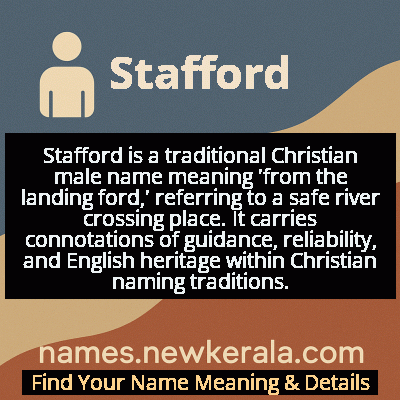Stafford Name Meaning & Details
Origin, Popularity, Numerology Analysis & Name Meaning of Stafford
Discover the origin, meaning, and cultural significance of the name STAFFORD. Delve into its historical roots and explore the lasting impact it has had on communities and traditions.
Name
Stafford
Gender
Male
Origin
Christian
Lucky Number
8
Meaning of the Name - Stafford
Stafford is a traditional Christian male name meaning 'from the landing ford,' referring to a safe river crossing place. It carries connotations of guidance, reliability, and English heritage within Christian naming traditions.
Stafford - Complete Numerology Analysis
Your Numerology Number
Based on Pythagorean Numerology System
Ruling Planet
Saturn
Positive Nature
Ambitious, efficient, realistic, and authoritative.
Negative Traits
Materialistic, stressed, confrontational, and can be overly ambitious.
Lucky Colours
Dark blue, black.
Lucky Days
Saturday.
Lucky Stones
Blue sapphire, amethyst.
Harmony Numbers
2, 4, 6.
Best Suited Professions
Business leaders, managers, financial services, law enforcement.
What People Like About You
Leadership, determination, organizational skills.
Famous People Named Stafford
Stafford Cripps
Politician
British Chancellor who implemented post-war economic policies
Stafford Beer
Scientist
Pioneer in management cybernetics and operations research
Stafford Repp
Actor
Played Chief O'Hara in the 1960s Batman television series
Stafford Northcote
Politician
19th century British Chancellor and Foreign Secretary
Name Variations & International Equivalents
Click on blue names to explore their detailed meanings. Gray names with will be available soon.
Cultural & Historical Significance
Extended Personality Analysis
Individuals bearing the name Stafford typically project an image of reliability, stability, and traditional values. The name's origins as a safe river crossing point suggest personality traits centered around providing security and guidance to others. Staffords are often perceived as grounded individuals with practical wisdom—the type of people others turn to during difficult transitions or when needing sound advice. They tend to be methodical in their approach to problems, carefully considering options before acting, much like travelers would assess a ford before crossing. The aristocratic history of the name contributes to associations with leadership, dignity, and a sense of responsibility. Staffords often exhibit natural authority without being authoritarian, commanding respect through their competence and integrity rather than forcefulness. They typically value tradition and continuity while being adaptable enough to navigate changing circumstances. Their strength lies in their consistency and the trust they inspire in others, making them natural pillars in their families, workplaces, and communities. While they may not seek the spotlight, Staffords often find themselves in positions of influence due to their reliable nature and ability to handle responsibility with grace.
Modern Usage & Popularity
In contemporary naming practices, Stafford maintains a position as a distinguished but uncommon choice that appeals to parents seeking traditional English names with historical depth. Its usage remains most prominent in English-speaking countries, particularly the United Kingdom, United States, Canada, and Australia, where it carries connotations of English heritage and aristocratic lineage. The name has never reached widespread popularity, which preserves its exclusive and sophisticated character. Modern parents who choose Stafford often appreciate its strong, traditional sound and the way it connects their child to centuries of English history without being overly common or trendy. The name's steady but modest usage pattern ensures it doesn't become associated with any particular generation or dating quickly. In recent years, there's been a slight increase in interest as part of the broader trend toward vintage and heritage names, though Stafford remains far less common than similar traditional names like Edward or William. Its continued use demonstrates the enduring appeal of names that carry historical weight and cultural significance.
Symbolic & Spiritual Meanings
Symbolically, Stafford represents the concept of safe passage and reliable guidance through life's challenges. Drawing from its literal meaning of a landing ford, the name embodies the idea of creating stable crossing points between difficult situations and safer ground. It symbolizes the ability to navigate transitions and help others through uncertain times. The name carries connotations of stewardship and responsibility, reflecting its aristocratic heritage and the role of guiding and protecting others. Metaphorically, Stafford suggests a bridge-builder—someone who connects separated elements, whether people, ideas, or communities. It represents practical wisdom, grounded decision-making, and the provision of security in uncertain circumstances. The name also symbolizes English cultural continuity and the preservation of tradition while adapting to modern contexts. In spiritual terms, it can represent the Christian concept of being a 'way-maker' or guide, helping others find their path through life's challenges with faith and practical support.

